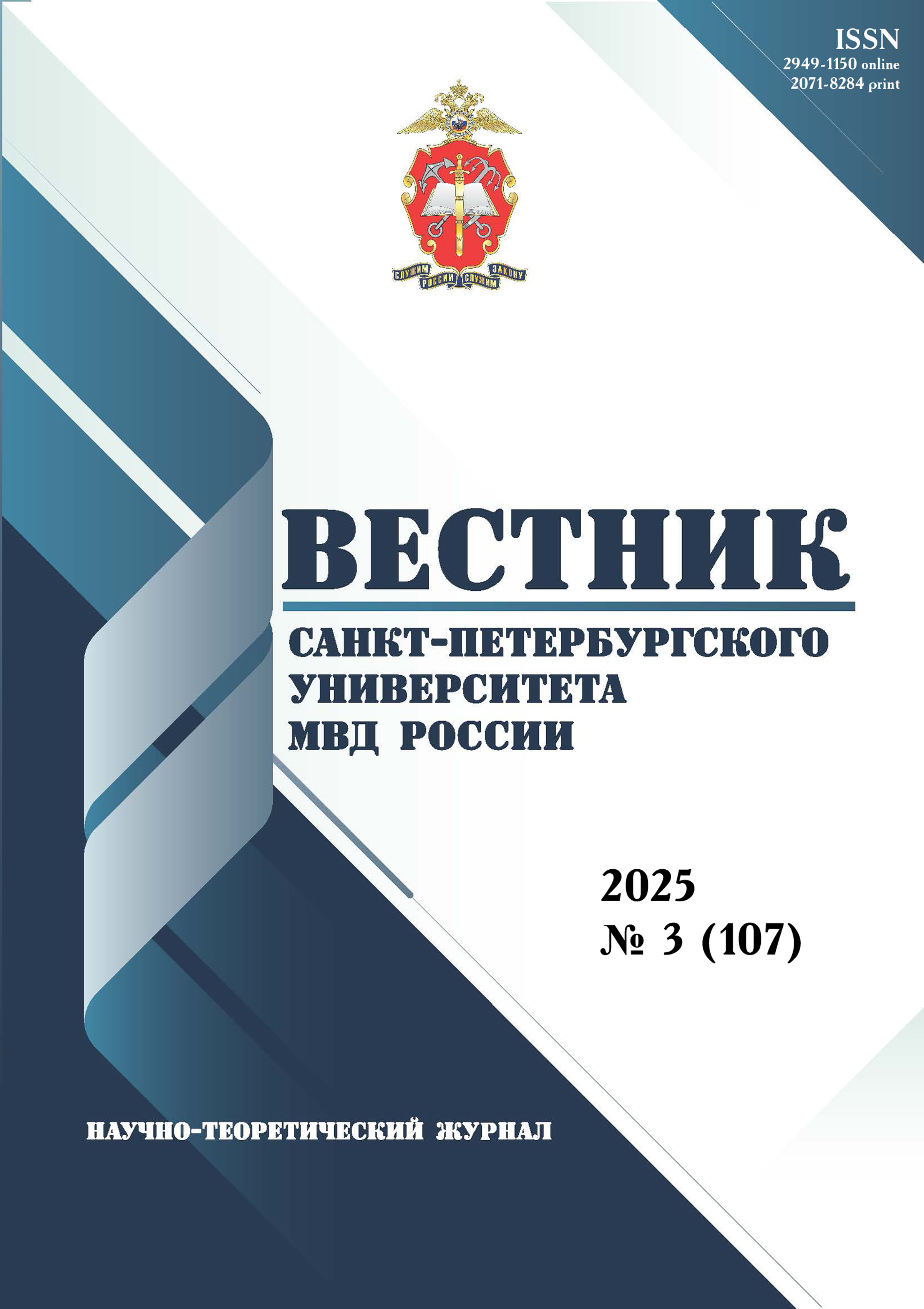employee from 01.01.2014 until now
Russian Federation
UDC 340
CSCSTI 10.07
Introduction. The issue of establishing internal sovereignty in the current period holds significant importance for enhancing Russian statehood and engaging with the founding character of state authority. This article offers an interpretation of founding power within the framework of forming and protecting internal legal sovereignty. Existing perspectives on this scholarly problem lack adequate explanation, particularly regarding the theoretical and legal rationale for founding power, i.e., constitutional power, which defines its own conceptual and semantic discourse. In legal scholarship, this conception of founding power in relation to the formation and protection of internal and external legal sovereignty in the Russian Federation possesses distinct features and practical relevance, requiring its own semantic content. On one hand, founding power is differentiated from other forms of authority within the state; on the other hand, it is embedded in the context of the constitutional and legal development of the state as an initiating factor in the constitutionalisation of the political life of society. Importantly, within the analysis of Russian internal legal sovereignty, this opposition facilitates a deeper understanding of the role of founding power in shaping and amending the Constitution. Methods. The research employed materialistic-dialectical, logical, hermeneutical, and formal-dogmatic methods of scientific inquiry. Results. The article uncovers the link between founding power and internal legal sovereignty, originating from the act of state establishment, wherein the sovereign legal action of the people and their sovereign will to create the foundations of the future state system are evident. The founding act assumes a law-generating character, embodying the sovereign will of the people and establishing fundamental legal norms that serve as the basis for the entire legislative system and national law. This enables the conclusion that legal sovereignty as a social phenomenon is clearly demonstrated in the actions of the founding authorities. The author deduces the role of legislation in the formation of the legal system and the rule of law, which aims to harmonise social relations, ensure the observance of human and civil rights and freedoms, and embody the principle of justice.
founding power, legal sovereignty, Russian statehood, law, legal system, implementation act
1. Fomichenko M. P. Uchreditel'naya vlast': ponyatie, raznovidnosti // Pravovaya kul'tura. 2011. № 2 (11). S. 96–97.
2. Balagurova N. N. Uchreditel'naya vlast': ponyatie i sposoby ee realizacii // Vestnik Chelyabinskogo gosudarstvennogo universiteta. 2009. № 7 (145). S. 14–19.
3. Komarova V. V. Uchreditel'naya vlast' i osnovnoy zakon // Lex Russica (Russkiy zakon). 2013. T. 95, № 12. S. 1374–1382.
4. Miroshnik S. V. K voprosu o gosudarstvennom suverenitete // Severo-Kavkazskiy yuridicheskiy vestnik. 2020. № 2. S. 62–67. https://doi.org/10.22394/2074-7306-2020-1-2-62-67
5. Lihachev K. S. Uchreditel'naya vlast': ponyatie, vidy i sovremennoe voploschenie // Vestnik Moskovskogo universiteta MVD Rossii. 2012. № 10. S. 48–50.
6. Shustrov D. G. Konstituciya i uchreditel'naya vlast': problema ogranicheniya // Konstitucionnoe i municipal'noe pravo. 2022. № 2. S. 29–39. https://doi.org/10.18572/1812-3767-2022-2-29-39
7. Bensel R. F. The Founding of Modern States. UK : Cambridge University Press, 2022. 508 r. https://doi.org/10.1017/9781009247245
8. Golovin A. G. O suschnosti prava na uchastie v referendume v kontekste delegirovaniya vlasti narodom // Aktual'nye problemy rossiyskogo prava. 2022. T. 17. № 10 (143). S. 90–101. https://doi.org/10.17803/19941471.2022.143.10.090-101
9. Kel'zen G. Sudebnaya garantiya konstitucii (Konstitucionnaya yusticiya. Chast' 1) // Pravo i politika : [cetevoe izdanie]. 2006. № 8. URL: https://nbpublish.com/lpmag/contents_2006_8.html#50010.
10. Kel'zen G. Sudebnaya garantiya konstitucii (Konstitucionnaya yusticiya. Chast' 2. Okonchanie) // Pravo i politika : [cetevoe izdanie]. 2006. № 9. URL: https://www.nbpublish.com/library_read_article.php?id=-4023
11. Antonov M. V. Legitimnost', priznanie, deystvitel'nost' i otmena pravovyh norm v yuridicheskom slovoupotreblenii // Rossiyskiy zhurnal pravovyh issledovaniy. 2018. T. 5, № 2 (15). S. 118–124.
12. Shmitt K. Politicheskaya teologiya. Sbornik // per. s nem., zaklyuch. i sost. A. Filippova. Moskva : KANON-press-C, 2000. 336 s.
13. Nazmutdinov B. V. Ot «normy» k «poryadku»: evolyuciya pravoponimaniya Karla Shmita // Pravovedenie. 2016. № 1 (324). S. 150–165.
14. Antonov B. A. Ob osobennostyah tolkovaniya normativizma s pozicii Karla Shmitta: zametki na polyah // Prolog: zhurnal o prave. 2023. № 3 (39). S. 7–17. https://doi.org/10.21639/2313-6715.2023.3.1
15. Kotov O. Yu. Normativistskaya teoriya Gansa Kel'zena kak osnova dlya ponimaniya pravovoy prirody aktov konstitucionnogo suda // Lex Russica. 2021. T. 74, № 8. S. 89–98. https://doi.org/10.17803/1729 5920.2021.177.8.089-098
16. Pravo i zakon v teorii yuridicheskogo pozitivizma / Artamonova G. K., Gorbashev V. V., Il'ichev V. V., Minakov I. A. [i dr.] // Yuridicheskaya nauka: istoriya i sovremennost'. 2012. № 1. S. 148–152.
17. Kornev V. N., Lomtev S. P. Ponyatie gosudarstva v kontekste osnovnyh tipov pravoponimaniya // Rossiyskoe pravosudie. 2012. № 8 (76). S. 32–41.
18. Mazaev V. D. Poisk novyh smyslov prodolzhaetsya (po vnesennym popravkam k Konstitucii RF) // Lex Russica. 2021. T. 74, № 7. S. 15–31. https://doi.org/10.17803/1729-5920.2021.176.7.015-031
19. Vitruk N. V. O kategoriyah pravovogo polozheniya lichnosti v socialisticheskom obschestve // Sovetskoe gosudarstvo i pravo. 1974. № 12. S. 11–19.
20. Mal'ko A. V., Subochev V. V. Garantii osuschestvleniya zakonnyh interesov // Izvestiya vysshih uchebnyh zavedeniy. Pravovedenie. 2007. № 6 (275). S. 138–148.
21. Cherdancev A. F., Gunin D. I. Interesy zakonnye, protivozakonnye i nezakonnye // Rossiyskoe pravosudie. 2013. № 7. S. 12–21.














